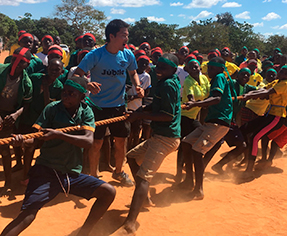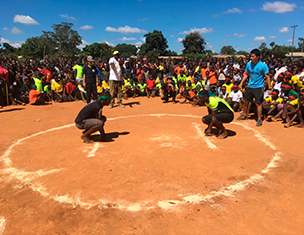Stories from the Field 5
For a Positive Change in School Education through Holding Japanese-Style Sports Day (UNDOKAI)!
– Efforts by Japan Overseas Cooperation Volunteers in Malawi, Africa
In May 2018, a Japanese-style sports day (UNDOKAI) was held at an elementary school in the Kasungu district in the north of the Malawi capital Lilongwe. This was planned and realized by three Japan Overseas Cooperation Volunteers (JOCVs), including Mr.Yu Kurita, who was appointed to the position in 2017.
In Malawi, the first Japanese-style UNDOKAI was held in 2015 under the SPORT FOR TOMORROW* initiative, and gradually became popular in the country. Previously in Malawi, children enjoyed soccer and other sports, but physical education was nonexistent among the regular curriculum. Amid this situation, why did they organize a Japanese-style UNDOKAI at the elementary school? Mr. Kurita explains the trigger as follows.
“I was sent to the school as an arithmetic teacher, but there were many children who were unable to concentrate on their study, because each class was quite large with as many as 70 to 80 pupils, and there was a lack of discipline in classes due to the noisiness even during lessons. Furthermore, since there were no extracurricular activities in schools in Malawi, students simply attended classes every day and went home, just like attending cram schools in Japan. Therefore, I wanted to give the children an experience where all the classmates could enthusiastically work on something together. So, I consulted with my fellow JOCVs appointed to nearby locations, and planned to organize an UNDOKAI.”
Although UNDOKAI are common in Japan, there were a variety of challenges to holding one in Malawi. The first challenge was to get local teachers to understand the concept of this unfamiliar activity called UNDOKAI, and gain their cooperation. Mr. Kurita says that he requested their cooperation by showing them video clips of UNDOKAI in Japan and the children’s enthusiasm. As a result, little by little, he was able to obtain the cooperation of the local teachers, and eventually practices for UNDOKAI with the children began.
He recalls, “When we started practicing, it was necessary to start with teaching the children the very basics of physical education, such as lining up and following the rules. At the same time, it was also necessary to teach the local teachers, who had no experience in teaching physical education. However, as the children practiced over and over, an attitude of cooperation started to develop among them, to the extent that they even discussed among themselves what they can do to improve.”

Students clenching their teeth while pulling a rope (Photo: Ai Yasutomi)

Malawian children taking part in sumo, with a serious look on their faces (Photo: Ai Yasutomi)
The UNDOKAI was held on Saturday when the schools were closed. Fifty children were selected respectively from three schools, and were put together as a team to compete against each other. Athletic events which are easy to play and have easy-to-understand rules were selected, including “tug of war,” “relay,” “sumo,” and “chicken fights.” The children’s concentration on the day of the event while competing was incredible. A variety of scenes unfolded, such as children jumping up with great joy when winning as well as full of disappointment when losing, amid big cheers from fellow team members and families who also came to cheer.
Mr. Kurita mentions, “I was happy as it was the first time I saw the children getting together and working on something so seriously. Through this activity, a drastic change also occurred in regular class rooms. Firstly, awareness to follow the rules sprang up among the children, and a sense of discipline took place in the class, which led to their increased concentration. I noticed that they became capable of showing distinctions between playing during play hours and studying hard during study hours in everyday life. I truly felt that their attitudes towards the lessons had clearly changed.” He says, after the UNDOKAI, there were many children who asked, “Teacher, when is the next UNDOKAI?”
Mr. Kurita is creating a manual in English for organizing UNDOKAI for the local teachers, so that the teachers can continue to hold UNDOKAI at the school. The UNDOKAI in 2019 is planned to be organized under the leadership of local teachers. With regard to the events, he is thinking of including not only typical Japanese sports, but also traditional Malawian games, to make the UNDOKAI take further root in the local schools.
Mr. Kurita adds, “In my early days in Malawi, due to cultural differences, numerous things bewildered me every day, but through teaching the children, I also learned a lot from them. The success of the UNDOKAI and the fact that the children’s aspiration to learn had increased, have become a great part of my confidence as a teacher. I want to make use of this amazing experience in my work as a teacher even after returning to Japan.”
* An international contribution program for sports, based on public-private cooperation, to promote sports to over 10 million people in 100 countries, mainly in developing countries, by 2020, the year of the Tokyo Olympic and Paralympic Games.
<< Previous Page Next Page >>
Main Text | Reference Statistics | Stories from the Field | Master Techniques from Japan to the World | ODA Topics
